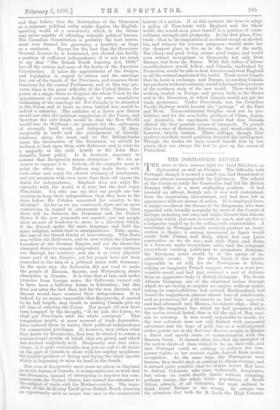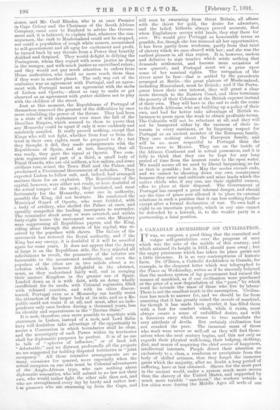THE PORTUGUESE REVOLT. T HE stars in their courses fight for
Lord Salisbury, as diplomatist as well as Premier. The difficulty with Portugal, though it seemed a small one, had threatened to become almost unmanageable by diplomacy. The refusal of the Cortes to ratify the Convention had left the British Foreign Office in a most unpleasing position. It had received an affront, though not, it was well understood, from the negotiating Government, and had been left in appearance without means of action. If it employed force, it might overthrow the throne of the Braganzas, who were regarded with friendly sympathy by most of the Courts of Europe, including our own, and might disturb that delicate equipoise which just now is worth so much, and set fire to a magazine loaded up to the ceiling with combustibles. A revolution in Portugal would certainly produce an insur- rection in Spain ; a serious movement in Spain would excite both France and Italy, which feel any Latin commotion as we do not ; and with Paris and Rome in a ferment, mobs everywhere astir, and the telegraph everywhere exciting politicians to premature decisions, the European peace would be at the mercy of in- calculable events. On the other hand, it was nearly impossible to sit still, for the Portuguese in Africa, relying on imaginary French support, were in a most pro- vocative mood, and had just received a sort of defiance from an aggressive body of British. Colonists. The South African Company, one of the chartered bodies through which we are trying to acquire an empire without under- taking its responsibilities, had entered Mashonaland, had found the magnificent plateau almost bare of inhabitants, and as promising for gold-miners as had been expected, and had advanced into Manica, its eastern edge,—that is, across the imaginary line which we had promised, while the modus vivendi lasted, that is, till the end of May next, not to overstep. It was nearly impossible to recede, for the new colonists were not only flushed with successful adventure and the hope of gold, but, as a well-informed writer points out in the National Review, sought in Manica a direct and speedy route of communication with the Eastern Coast. It seemed clear, too, that the strongest of the native chiefs of clans wished to be on their side, and that Portugal could do nothing to enforce her tem- porary rights, or her ancient rights derived from partial occupation. At the same time, the Portuguese were furious, they would. stick at nothing to obtain revenge, and it seemed quite possible that we might before May have to defend Colonists who were technically trespassers, but whom we could hardly desert without irritating, perhaps losing, the whole white population of South Africa, always, of all Colonists, the most inclined to i think Great Britain in the wrong. So serious was the situation, that both Sir H. Loch, the High Commis- sioner, and Mr. Cecil Rhodes, who is at once Premier in Cape Colony and the Chairman of the South African Company, came over to England to advise the Govern- ment and, it is believed, to explain that, whatever the con- sequences, the rush to Mashonaland could not be stopped, nor could a population of rough white miners, accustomed to self-government and all agog for excitement and profit, be turned back by any threats from a Power they heartily disliked and despised. They would delight in defying the Portuguese, whom they regard with some justice as dogs in the manger, and with much justice as uncivilised rulers ; and they would not pay much attention to orders from Home authorities, who could no more reach them than if they were in another planet. The only way out of the confusion was an agreement with Portugal, and an agree- ment with Portugal meant an agreement with the mobs of Lisbon and Oporto,—about as easy to make or get observed as an agreement with gutter children not to play with the children of the street.
Just at this moment, the Republicans of Portugal of themselves removed the greatest of the difficulties by once more rebuilding the power of the throne. They had been in a state of wild excitement ever since the fall of the Brazilian Empire, which seemed to them to prove that any Monarchy could be upset if only it were suddenly and resolutely assailed. It really proved nothing, except that Kings who will not fight, whether from fear or from dis- trust in their own rights, must be prepared to fly ; but they thought it di& they made arrangements with the Republicans of Spain, and at last, fancying that all was ready, they gave the signal at Oporto. Two com- plete regiments and part of a third, a small body of Fiscal Guards, who are old soldiers, a few sailors, and some civilians rose, seized the Town Hall and the Palace, and proclaimed a Provisional Government of nobodies. They expected Lisbon to follow suit, and, indeed, had arranged matters there for an explosion. The Republicans of the capital, however, were either not ready, or were doubtful of the actual temper of the mob ; they hesitated, and most fortunately for the Monarchy, some one in authority, possibly the King, did not hesitate. He reinforced the Municipal Guard of Oporto, who were faithful, with a body of artillery, who shelled the Palace at once, and speedily compelled the leading insurgents to surrender. The remainder slunk away or were arrested, and within forty-eight hours the movement was over, the Ministry were suppressing all Republican papers, and the King, riding alone through the streets of his capital, was re- ceived by the populace with cheers. The failure of the ,movement has restored the Royal authority, and if the King has any energy, it is doubtful if it will be assailed again for some years. It does not appear that the Army at large is on the Republican side, the Navy rejected all solicitations to revolt, the peasantry of the interior are favourable to the accustomed authority, and even the populace of the cities are in two minds about a re- volution which, however delightful in the abstract, must, as they understand fairly well, end in merging their ancient Kingdom in the greater one of Spain. Loaded down as it is with debt, with an Army wholly insufficient for its needs, with Colonial regiments filled with released convicts, and with its cities discon- tented, Portugal even as a Monarchy can hardly resist the attraction of the larger body at its side, and as a Re- public could not resist it at all, and must, after an inde- pendence only once broken during a thousand years, lose its identity and separateness in the " Iberian State." It is now, therefore, once more possible to negotiate with statesmen in Lisbon, instead of a mob, and Lord Salis- bury will doubtless take advantage of the opportunity to secure a Convention in which boundaries shall be clear, and the sovereignty of each Power within its territories shall for diplomatic purposes be perfect. It is of no use to talk of " spheres of influence," or of land .left " debateable," and we distrust profoundly all the projects we see suggested for holding disputed territories in "point occupancy." All those tentative arrangements are so many occasions for quarrel, more especially when the actual occupiers on one side must be Colonial adventurers of the Anglo-African type, who care nothing about diplomatic necessities, who will submit to no law not their own, who would rather fight the other side than not, and who are strengthened every day by hardy and rather law- ss pioneers who are swarming up from the Cape, and will soon be swarming from Great Britain, all aflame with the thirst for gold, the desire for adventure, and the belief, hitherto always proved accurate, that when Englishmen occupy wild lands, they stay there for ever. We would give Portugal as honourable terms as possible, for, though she has misused all her opportunities, it has been partly from weakness, partly from that taint of slavery which we once shared with her ; and she was the earliest pioneer in all this region. It is, however, useless and delusive to sign treaties which settle nothing that demands settlement, and become mere occasions of new quarrel; and Portugal must set a price upon some of her nominal rights. The navigation of the rivers must be free—that is settled by the precedents arranged at Berlin—the great plateau of Mashonaland, including Manicaland, must be British ; and if the Portu- guese know their own interest, they will grant a clear route through to the Eastern Coast, and thus terminate the poverty of their Colonies at the British expense instead of their own, They will have in the end to cede the route to the South Africans, who are building up a policy of their own, and had far better take advantage of British re- luctance to press upon the weak to obtain profitable terms. The Colonists will not be reluctant at all, and they will not be hampered either by the vastness of their in- terests in every continent, or by lingering respect for Portugal as an ancient member of the European family. They care nothing about the European family, and will be no . more respectful to Portugal than the Texans were to Mexico. They are on the inside of the African Continent and in actual possession, and it is folly to think that they can be kept for any long period of time from the nearest route to the open water. We would secure all we need by liberal bargaining, so far as that is possible ; but in May the modus vivendi ends, and we cannot be shooting down our own countrymen because they enter and cultivate and mine lands which the native chiefs who, if any one, are their rightful owners, offer to place at their disposal. The Government of Portugal has escaped a great internal danger, and should use the time of grace now allowed it to place its external relations in such a position that it can lose nothing further except after a formal declaration of war. To own half a right to an uncertain property, which in any case cannot be defended by a lawsuit, is, to the weaker party in a partnership, a fatal position.











































 Previous page
Previous page